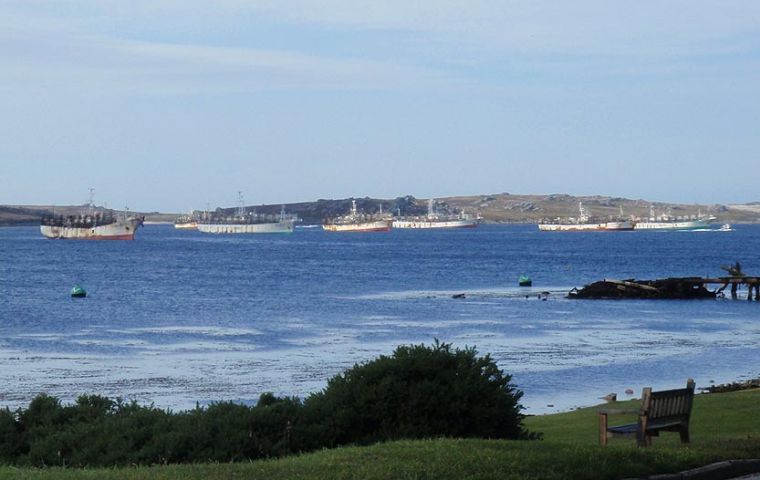MercoPress. South Atlantic News Agency
Falklands’ economy poised to expand 5.3% following a contraction in 2009
 Asian jiggers waiting in Stanley to collect their squid licences
Asian jiggers waiting in Stanley to collect their squid licences The Falkland Islands economy is expected to expand by 5.3% in real terms during 2010, following a period of contraction in 2009, which was caused primarily by a poor fish harvest rather than the immediate effects of the global recession, according to the Economic Briefing & Forecast released by the Falklands’ government.
Fisheries is the largest sector in the Falklands economy, producing just over 50% of GDP and the main products are Illex and Loligo squid, together with fin-fish species such as rock cod, hake, kingclip and the valuable Chilean sea bass.
According to the document during 2010 above-average growth in public sector output, fisheries, agriculture and utilities should help compensate for an anticipated reduction of 15-20% in cruise ship tourism.
Tourism a great direct contributor to the Falklands economy saw the Islands receive 105 cruise ship visits carrying 62,500 passengers during the 2008/09 summer.
The retail trade, construction and hospitality industries are also expected to benefit this year from the ongoing de-mining and oil drilling projects and the imminent upgrade and extension of the runway and Mount Pleasant Airport.
Contractors employed by the British government commenced work during summer 2009-10 on locating, removing and destroying approximately 20,000 landmines laid by Argentine military forces after they invaded the Falkland Islands in 1982.
The semi-submersible drilling rig Ocean Guardian arrived in Falkland Islands waters in late January 2010, after an 83 day journey from Scotland. The oil drilling campaign is expected to last 8 months, after which it is anticipated that Ocean Guardian will leave Falklands waters while the results of the drilling campaign are analysed.
The first well, for Desire Petroleum, was ‘spudded’ on 22 February 2010. Desire Petroleum plans to drill a minimum of four wells (with the possibility of an additional two wells) while Rockhopper Exploration plans to drill two wells, all in waters to the north of the Falkland Islands. Ocean Guardian will also drill one well for BHP Billiton, and partner Falklands Oil and Gas, to the south of the islands.
Ocean Guardian is supported by three vessels, Maersk Traveller, Maersk Pacer and Toisa Invincible. These three tugs take it in turn to monitor the 500 metre safety exclusion zone enforced around the rig.
“The Falkland Islands are not remote from the world economic pressures as highlighted by a drop in investment income. Further economic decline during 2009 was caused by a poor squid harvest and reduced tourism spending. The full impact of this drop was somewhat offset by the Falkland Islands Government approving a deficit budget” said Roger Edwards spokesperson for members of the Legislative Assembly.
He went on to say, “The current year, in line with other world economies should see some recovery with early signs of an improved catch within the Illex fishery and higher wool and meat prices within the agricultural sector. The outlook in tourism remains bleak. Further effects could be felt by local residents as a result of a weaker sterling and higher oil prices adding to inflationary living and housing costs.”
Mr Edwards concluded, “The Falkland Islands Government has a duty of care to future generations, and in partnership with the private sector and other public agencies is actively progressing the Economic, Rural and Tourism Development Strategies to enable the Islands to make the most of future economic challenges and opportunities.”
The Economic Briefing & Forecast for 2010 is a seven pages document which examines the current global environment and its likely impact on the Falkland Islands. It reviews the fisheries, agriculture, tourism and other commercial sectors and examines the implications for the public finances of the Falklands.
The economic document was written by Sonny Jose, the Falkland Islands Government’s Head of Policy and Economic Adviser. Prior to joining the Islands’ Government in 2008, Mr Jose was managing a private investment fund and was marketing consultant to Glocap Partners LLC of New York. He is a trained economist with over 25 years of international experience in finance, investment, marketing and development.




Top Comments
Disclaimer & comment rules-

-

-

Read all commentsGood news. Overfishing by Argentine boats remains a huge problem, but once the squid are gone they're gone. It is to be hoped that an oil industry will come along to replace any losses from fishing.
Mar 13th, 2010 - 01:57 am 0Keep on dreaming. The oil industry will not have the smooth sailing that you think. I suspect theat there will be a few surprises in the road ahead. Argentina will perform better though, 7%.
Mar 13th, 2010 - 02:49 am 0Exocet82
Mar 13th, 2010 - 08:24 am 0Please indicate what surprises could possibly get in the way of the Islands establishing a hydrocarbon industry (providing of course the exploration is successful). The Argentine leadership appear to have played all their cards at once with the only the option of refering the matter to The Hauge (which they have at the moment ruled out).
While it would be better for all to enjoy an industry partnership with Argentina it is still economically viable to bypass Argentina and process the raw crude in another location either in South or North America, West Africa or indeed the UK.
A right of centre politician in now in place in Chile and there is an election in Argentina which may result in less jingoism and more sound economic descisions that would benefit Argentine citizens directly and indirectly.
Do you want this opportunity to provide a more comfortable life for your family or would you rather cut off your nose to spite your face?
Dr Beef
Commenting for this story is now closed.
If you have a Facebook account, become a fan and comment on our Facebook Page!